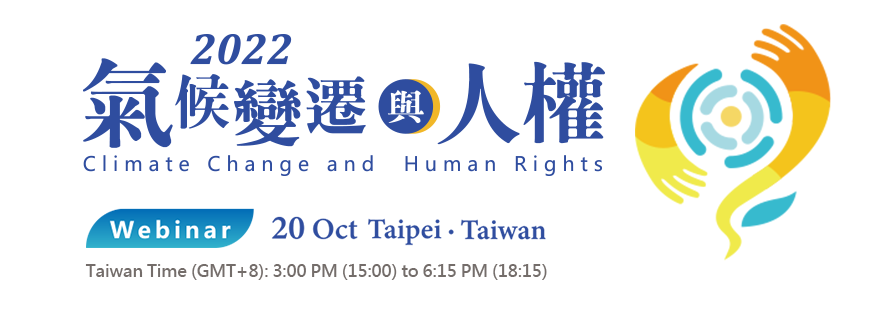什麼是人權(Human Rights)?它是指所有人與生俱有的權利,不分種族、性別、國籍、族裔、語言、宗教或任何其他身份地位,而有不同。何為「與生俱有的權利」?則是隨著時代意識的演變而逐步擴充、完善。
1948年聯合國通過之《世界人權宣言》(Universal Declaration of Human Rights)為國際人權法體系奠定基礎,70多年後,2022年7月聯合國大會決議(A/RES/76/300)通過「享有乾淨、健康和永續的環境是一項基本人權」。
決議也承認,環境退化、氣候變遷、生物多樣性喪失、荒漠化和不永續發展,對今後世代有效享有所有人權,產生最急迫和嚴重的威脅。
由於氣候變遷在許多方面對於人權帶來衝擊(或調適所造成的社會變動),早於2008年3月聯合國人權理事會第7/23號決議(Human Rights Council, 41st meeting),即對氣候變遷「對全世界民眾和社群構成緊迫和深遠威脅」表示關切,並請聯合國人權高專辦編寫一份關於氣候變遷與人權之間關係的研究報告,開啟關注氣候變遷與人權議題的濫觴。
2015年所通過之全球氣候公約《巴黎協定》,於前言段落進一步指出:承認氣候變遷是人類共同關心的問題,締約方在採取行動應對氣候變遷時,應當尊重、促進和考慮它們各自對人權、健康權、原住民權利、當地社區權利、移徙者權利、兒童權利、身心障礙者權利、弱勢權利、發展權,以及性別平等、婦女賦權和代際公平等的義務。
《巴黎協定》不是傳統意義的國際人權公約,其沒有定義人權,也沒有檢視與促進人權的機制。但是,《巴黎協定》確實為實現人權作出了重要貢獻,透過國家自定貢獻(Nationally Determined Contribution, NDC)納入人權因素,將之導入國內政策與法律之中;創建了一條新的人權途徑,把人權保護融入國家機構本身,形成一個更為整體的氣候變遷人權行動。可以說,《巴黎協定》是首次將人權義務作為國家氣候行動不可分割的組成部分之全球環境協議。
這是氣候變遷融入人權的新取徑,也是各國2050淨零路徑政策不可或缺的重要考量。
2022年5月,台灣通過首部「國家人權行動計畫」,將氣候變遷與人權列入八大人權議題之一,積極回應氣候變遷對處境不利群體之衝擊、公正轉型等新興議題,突顯台灣積極處理氣候變遷對人權產生衝擊之決心。但究竟,所謂有氣候與人權視野的計畫、行動與政策是什麼?從實體人權或程序人權角度,又各有何著重之處?國際人權法可以提供什麼樣的理論依據與政策支撐?都是值得進一步探討的議題。
為此,在環保署的補助下,本會特舉辦線上研討會,邀請國內外重要領域專家、學者共同討論,希望藉此引導、開啟對話交流,促使台灣做出有效的應對轉變;也邀請各方朋友,踴躍提出相關意見,豐富氣候變遷與人權的思考。
What are human rights? Human rights are rights inherent to all human beings, regardless of race, sex, nationality, ethnicity, language, religion, or any other status.
What are “rights inherent to all human beings”? It is gradually expanded and improved with the evolution of the consciousness of the times.
The foundations of International human rights law is the Universal Declaration of Human Rights, adopted by the UN General Assembly in 1948. More than 70 years later, the UN General Assembly passed a resolution (A/RES/76/300) – “The human right to a clean, healthy and sustainable environment" on 28 July 2022.
The resolution also recognizes that environmental degradation, climate change, biodiversity loss, desertification and unsustainable development pose the most urgent and serious threats to the effective enjoyment of all human rights for future generations.
Due to the impact of climate change on human rights in many aspects (or social changes caused by climate change adaptation), as early as the UN Human Rights Council Resolution 7/23 – Human Rights and Climate Change (Human Rights Council, 41st meeting) in March 2008. This resolution shows the Council expressed concern that climate change “poses an immediate and far-reaching threat to people and communities around the world” and requested the OHCHR to prepare a study on the relationship between climate change and human rights, start focusing on this issue.
The Paris Agreement, a global climate convention adopted in 2015 further stated in the preface: “Acknowledging that climate change is a common concern of humankind, Parties should, when taking action to address climate change, respect, promote and consider their respective obligations on human rights, the right to health, the rights of indigenous peoples, local communities, migrants, children, persons with disabilities and people in vulnerable situations and the right to development, as well as gender equality, empowerment of women and intergenerational equity”.
The Paris Agreement is not an international human rights convention in the traditional aspect. It does not define human rights, nor does it have a mechanism for examining and promoting human rights. However, the Paris Agreement did make an important contribution to the realization of human rights, incorporating human rights elements through Nationally Determined Contribution (NDC) into domestic policies and laws; creating a new approach to human rights that Human rights protection is integrated into national institutions themselves, forming a more holistic human rights action on climate change. It can be said that the Paris Agreement is the first global environmental agreement to make human rights obligations as an integral part of national climate action.
This is a new way to integrate climate change into human rights, and it is also an indispensable and important consideration for all countries Net-Zero by 2050 Roadmap.
In May 2022, Taiwan adopted the first National Human Rights Action Plan, which included climate change and human rights as one of the eight major themes, and actively responded to emerging issues such as the impact of climate change on disadvantaged groups and just transition, highlights Taiwan's determination to actively respond to the impact of climate change on human rights.
But what exactly are programs, actions and policies with a climate and human rights perspective? From the perspective of Substantive Human Rights or Procedural Human Rights, what is the focus of each one? What theoretical basis and policy support can international human rights law provide? All are topics worthy of further discussion.
To this end, with the support of the Environmental Protection Agency of the Executive Yuan, EQPF specially held this webinar to inviting domestic and foreign experts or scholars in important fields to discuss together, hoping to initiate dialogue, exchange of ideas and promote Taiwan to make effective response. We also glad to invite friends from various fields to actively put forward relevant opinions to enrich thinking on climate change and human rights.
